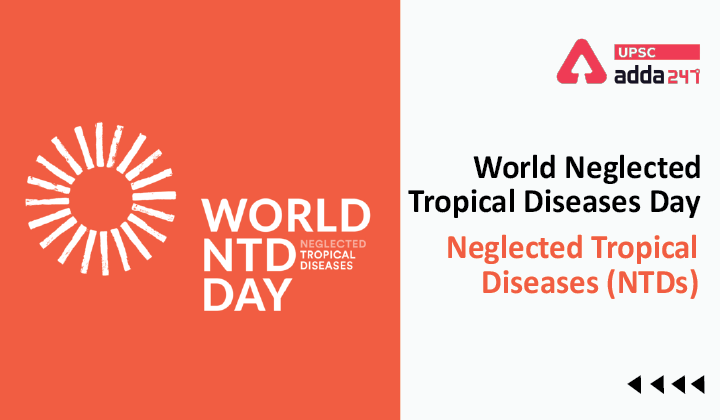Table of Contents
World Neglected Tropical Diseases Day- Relevance for UPSC Exam
- GS Paper 2: Governance, Administration and Challenges- Issues relating to development and management of Social Sector/Services relating to Health.

World Neglected Tropical Diseases Day- Context
- Recently, the World observed the 3rd World Neglected Tropical Diseases (NTDs) Day on 30th January 2022.
- India also joined the global movement to illuminate 100 landmarks across the globe to raise awareness on Neglected Tropical Diseases (NTDs).
- India joined close to 40 other nations to illuminate the iconic New Delhi Railway Station in purple and orange hues.
Priority Sector Lending: Meaning, history, targets, revision
World Neglected Tropical Diseases Day- Key Points
- About: World Health Assembly declared 30th January as ‘World Neglected Tropical Diseases (NTD) Day in 2021.
- The United Arab Emirates (UAE) led the proposal to declare 30th January as the World Neglected Tropical Diseases (NTD) Day in the 74th World Health Assembly.
- The first World NTD Day was celebrated informally in 2020.
- Objectives: World NTD Day aims to mobilize political will and secure commitments to eliminate NTDs in support of the WHO’s NTD Roadmap 2021-2030, including the elimination of at least 1 NTD from 100 countries by 2030.
- World NTD Day serves as a catalyst to translate awareness into action, secure increased resources for neglected tropical diseases (NTDs).
- World NTD Day crucially facilitates political leadership and ownership of NTD programs from affected countries.
- Organization in India: in India, National Centre for Vector-Borne Diseases Control (NCVBDC) is responsible for organizing and observing the World NTD Day.
Neglected Tropical Diseases- Key Points
- About: Neglected tropical diseases(NTDs) are widespread in the world’s poorest regions, where water safety, sanitation and access to health care are substandard.
- Transmission and Spread of the Disease: NTDs affect over 1.7 billion people globally and are caused mostly by a variety of pathogens including viruses, bacteria, parasites, fungi, and toxins.
- Reasons for Negligence: Neglected Tropical Diseases (NTDs) are “neglected” because they are almost absent from the global health agenda, enjoy little funding, and are associated with stigma and social exclusion.
- They are diseases of neglected populations that perpetuate a cycle of poor educational outcomes and limited professional opportunities.



 TSPSC Group 1 Question Paper 2024, Downl...
TSPSC Group 1 Question Paper 2024, Downl...
 TSPSC Group 1 Answer key 2024 Out, Downl...
TSPSC Group 1 Answer key 2024 Out, Downl...
 UPSC Prelims 2024 Question Paper, Downlo...
UPSC Prelims 2024 Question Paper, Downlo...





